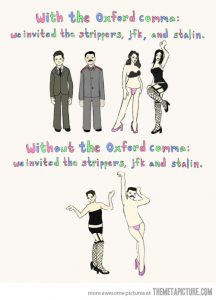- What words are used over other in your area of study? Have you experienced differences in writing styles due to having a liberal arts experience?
In my experience, the word “use” should be used over the word “utilized” in the English department. Generally, ‘utilized’ is seen as a more scientific word, whereas ‘use’ is more colloquial. Also, my senior year English teacher simply abhorred the word “utilized,” and thought that it was an overzealous “used.” That being said, I have definitely seen utilized being used in other departments, meaning I have been exposed to different styles due to the liberal arts experience
- At another point, the author mentions how the singular “they or their” should be excluded when gendered pronouns are avoided, for sentence fluidity’s sake: “Neither is considered acceptable in formal writing…do not use them in a singular sense.” (303). How might this argument be seen differently than an author of a Style Guide on writing?
This argument would be seen differently by an author of a Style Guide because he/she would be leaving an entire group without a way to express themselves accurately in writing. Simply, there needs to exist an option for moments where gendered pronouns are being avoided, otherwise the sentence wouldn’t be writeable.
